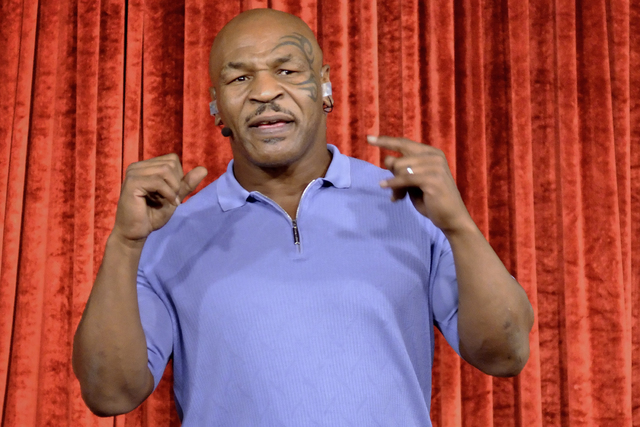Mike Tyson’s tale loses some emotional punch but still packs plenty of crazy

Mike Tyson is the first to point out what a strange path his one-man show has taken, to end up an escalator ride away from where it started.
The ex-champ surprised the world in 2012 when he decided to go on stage and tell his crazy life story in his own unhinged style. But “Undisputed Truth” lived up to its title in how it felt so honest and yet so bonkers, and it went from a test run in the MGM Grand’s showroom to Broadway and HBO and around the world.
But now? Tyson makes a slapstick show of bursting through the curtains of the Brad Garrett Comedy Club at the MGM, laughing about his downward mobility even as “I seek glory in everything I do.”
He’s the first to point out the more prestigious settings for this odd group therapy were “a roller-coaster ride of emotion.” But now he’s told his story so much he’s a step removed from the material, delivering it more like the stand-up comedy pros he shares the club with. “We’re keeping things light tonight,” he promises.
What follows is a sort of highlights reel of the original show, trading the focus that came from theatrical lighting cues and at least an extra half-hour for more sparring with a boozier audience. The most conspicuous omission is the story of his 1992 rape conviction and prison sentence, which he did address in longer versions of the show.
The one-man show seems routine enough to him now. The surprises come more when he veers from the script crafted with his wife, Kiki, still a backstage voice in his earpiece.
The first half-hour still packs some emotion as Tyson, 50, relates his awful childhood before he found the road out of juvenile detention in boxing and trainer Cus D’Amato as his surrogate father.
In one of his many asides, Tyson tells us his Broadway director, Spike Lee, brought in a speech coach. Whether it’s that or sheer repetition, Tyson is better at delivering lines such as he and D’Amato being “like two pirates ready to claim our treasure.”
But fear not: If you came for the crazy, you get plenty of it.
In an overscripted society, a certain presidential candidate has made part of the show’s appeal even more obvious: You never know just what the guy is going to say.
Tyson isn’t shy to talk about masturbation, yeast infections, or his first wife, Robin Givens.
Then there are the people in the front row, who may have felt like Ray Liotta to Tyson’s Joe Pesci in the “What do you mean I’m funny?” scene in “Goodfellas.” Tyson stops the momentum of a funny line to single out a guy up front: “Don’t make my (expletive) pain your gain.”
All good fun, except this is Iron Mike, a former world heavyweight champion and not some cigarette-stained insult comic.
The other structural points — the Givens marriage and his street fight with Mitch Green — also seem a little rushed here, but perhaps only if you’ve seen the longer version. At least the story about Green comes with a wig as visual aid.
No version of the show has kept the momentum from sliding in the third act. Perhaps it’s the arc of Tyson’s career: Poverty and too much money and fame at too early an age can explain a lot of bad behavior, while the older addict had no one to blame but himself. At least Tyson doesn’t ask for our pity, but makes a comic explanation of stepping us through the answers to, “How do you (burn) up $400 million?”
The story of a rehab counselor turning him around is shoehorned in at the end. But we see the results right there in front of us, along with the real reason why “Undisputed Truth” has worked from the get-go: Tyson’s desperate desire to entertain, to make us like him, no matter what it takes.
If the stories aren’t landing with a little punch and he has to dance a little while the music plays between them? Yes, he will.
Read more from Mike Weatherford at reviewjournal.com. Contact him at mweatherford@reviewjournal.com and follow @Mikeweatherford on Twitter.